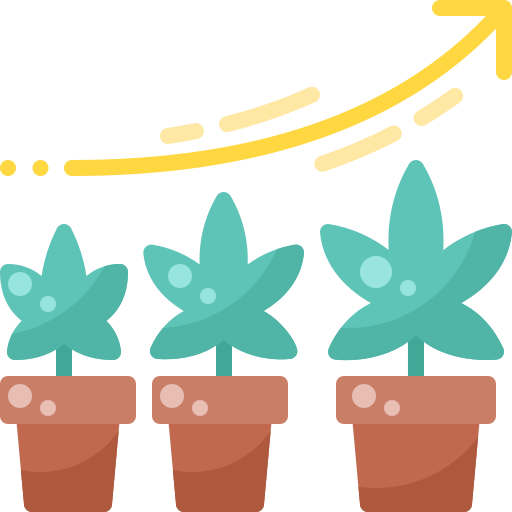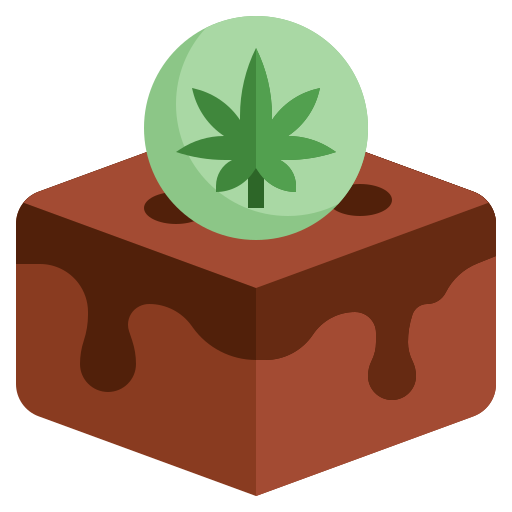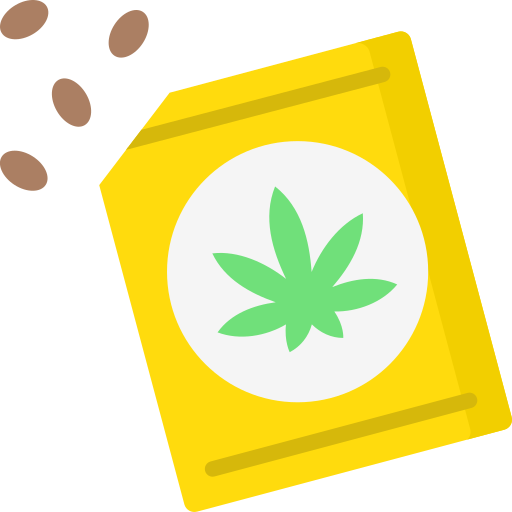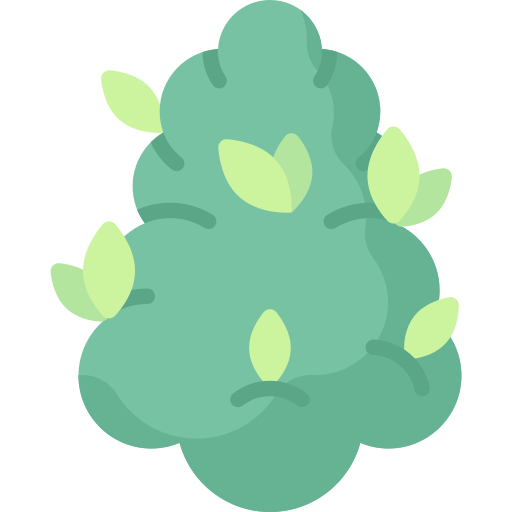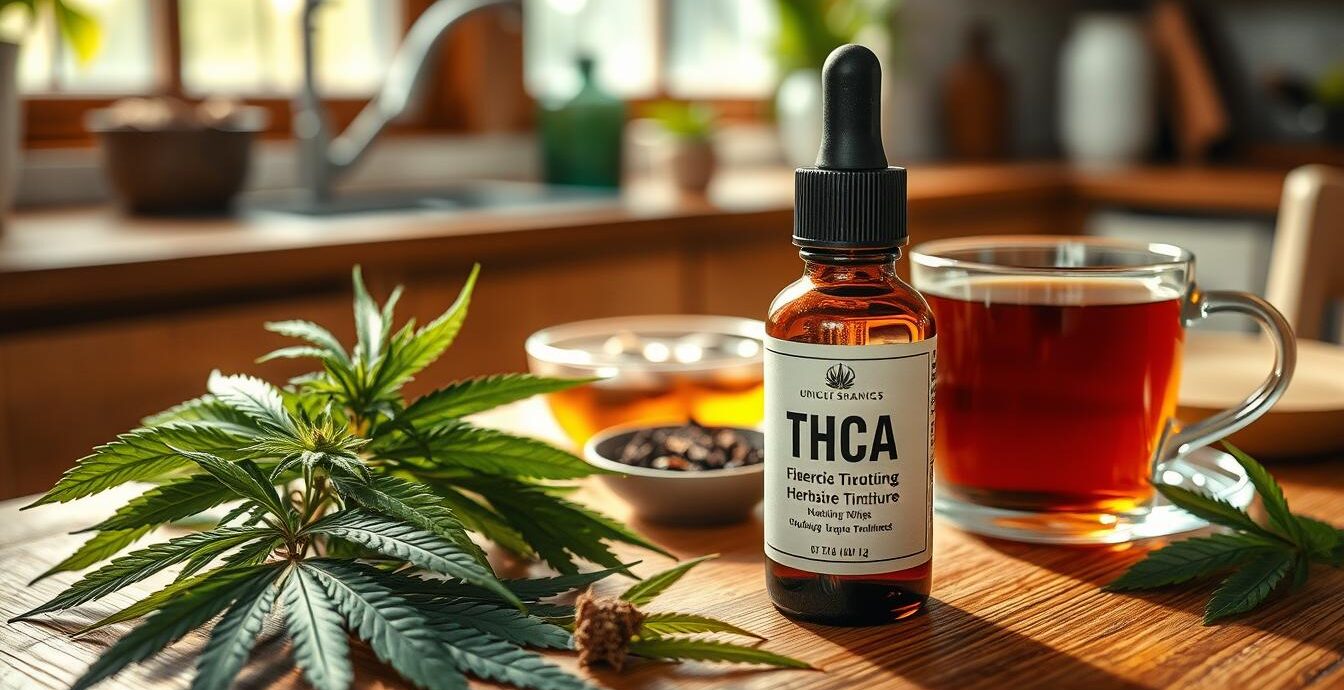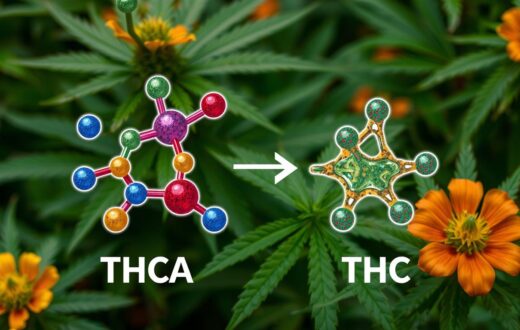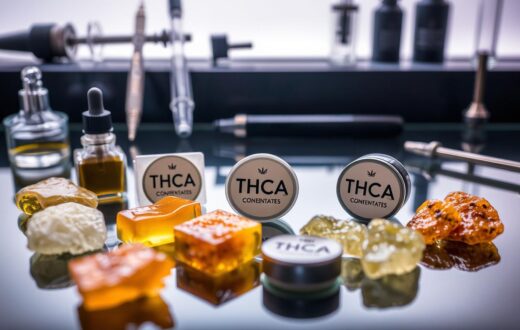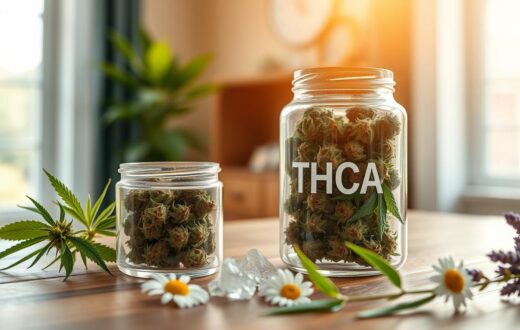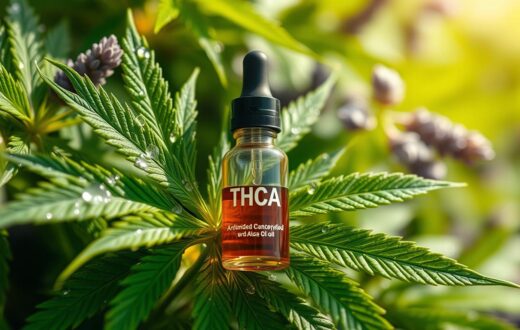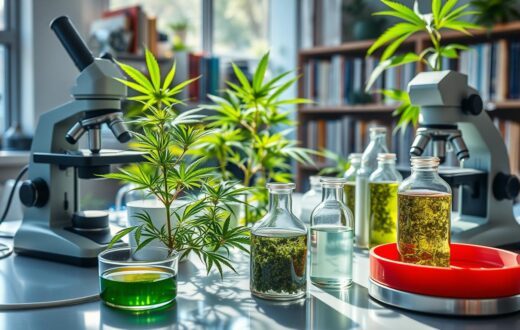Have you ever thought about the hidden benefits of cannabis that doesn’t get you high? THCA tinctures are gaining popularity for their unique properties. They offer a way to enjoy cannabis wellness without the high.
THCA, or tetrahydrocannabinolic acid, is found in raw cannabis plants. It’s a precursor to THC, the compound known for its intoxicating effects. But, THCA doesn’t cause a high when consumed in its raw form. This makes it interesting for those looking into thca tincture benefits.
Research is showing exciting uses for THCA. A 2017 study in the National Library of Medicine found it has neuroprotective properties. Other studies suggest it may help with nausea, inflammation, and pain relief. These findings are making THCA a popular choice for therapy.
Tinctures make it easy to use these benefits. They allow for precise dosing and can be added to daily routines. Whether taken sublingually or mixed into food and drinks, THCA tinctures offer a flexible way to enjoy cannabis wellness.
As we explore THCA tinctures further, we’ll look at their unique properties and health benefits. We’ll also compare them to other cannabinoids. Stay tuned to learn more about the possibilities that THCA tinctures offer.
Understanding THCA: The Basics
THCA, short for tetrahydrocannabinolic acid, is a key player in the world of cannabis compounds. This non-psychoactive substance is found in raw cannabis plants. It plays a crucial role in hemp wellness. Let’s dive into the basics of THCA and how it differs from its famous cousin, THC.
What is THCA?
THCA is a naturally occurring compound in cannabis. It’s the precursor to THC, the well-known psychoactive component. In raw form, THCA makes up to 90% of the THC content in cannabis plants. It’s found in tiny structures on the leaves and flowers.
Difference Between THCA and THC
The main difference lies in their effects. THCA doesn’t produce a high, unlike THC. Heat changes THCA into THC through a process called decarboxylation. This happens when you smoke or cook cannabis. Legal hemp must contain less than 0.3% THC, but can have higher THCA levels.
How THCA is Extracted
Extracting THCA involves careful processes to maintain its non-intoxicating properties. One method uses chromatography to create THCA crystals with up to 98% purity. These extraction techniques are vital for producing THCA products that comply with federal laws, which allow no more than 0.3% Delta-9 THC.
The Science Behind THCA Tinctures
THCA tinctures are at the forefront of cannabinoid research. They are plant-based supplements that offer a new way to use natural remedies. THCA is found in raw cannabis and is different from THC. It doesn’t make you high, which makes it interesting for scientists to study.
The Chemistry of Cannabinoids
Cannabinoids are compounds in cannabis plants. They work with our body’s endocannabinoid system. THCA is special because it doesn’t cause a “high.” This makes it a good candidate for medical use without getting you intoxicated.
Therapeutic Properties of THCA
Recent studies show THCA might have many health benefits. It could help with chronic diseases because of its anti-inflammatory properties. It also protects the brain, which could help with Parkinson’s or Alzheimer’s. Some research suggests it might also reduce nausea in people getting chemotherapy.
THCA tinctures are part of a growing trend in plant-based supplements. As more people look for natural remedies, cannabis products are becoming popular. While research is still in its early stages, the potential of THCA is promising. It offers a new option for those seeking alternative health solutions.
Potential Health Benefits of THCA Tinctures
THCA tinctures are becoming popular in alternative medicine for their health benefits. They are natural extracts that offer therapeutic effects without the high of THC. Let’s look at some key benefits of THCA tinctures for holistic health.
Anti-Inflammatory Effects
THCA may help reduce inflammation. This could be good for people with arthritis or inflammatory bowel disease. THCA tinctures might offer relief and improve life quality for many.
Neuroprotective Properties
Research indicates THCA could protect the brain. This is important for those with Parkinson’s or Alzheimer’s. THCA tinctures might protect brain cells and slow disease progression.
Pain Relief Potential
Many people use THCA for pain relief. It’s a natural alternative to traditional pain meds. THCA tinctures could be a good option for those with chronic pain.
Nausea Reduction
THCA may also reduce nausea and vomiting. This is especially helpful for cancer patients on chemotherapy. THCA could make treatments more tolerable and improve overall well-being.
THCA tinctures are a promising area in holistic health. They offer benefits without THC’s high. As research goes on, we might find more ways THCA can help our health and wellness.
Why Choose Tinctures Over Other Forms?
THCA tinctures are becoming a favorite way to use cannabis. They offer benefits that make them stand out. Let’s look at why many people prefer tinctures.
Fast Absorption Rates
THCA tinctures are known for their quick absorption. When you put them under your tongue, they go straight into your blood. This can happen in as little as 15 minutes.
Edibles, on the other hand, can take up to 3 hours to start working. So, tinctures are much faster.
Ease of Use
Tinctures are easy to use. They don’t smell, are easy to carry, and don’t need any special setup. You can add them to food or drinks.
This makes them great for anyone, whether you’re new to cannabis or have been using it for a while.
Precise Dosage
Getting the right amount of cannabis is important. Tinctures make it easy to do this. They usually come with a dropper, so you can control how much you take.
This is especially good for people using THCA for health reasons. It helps them get the same effect every time.
How to Use THCA Tinctures
THCA tinctures are a great way to enjoy cannabis without feeling high. They contain THCA, a part of the cannabis plant. Unlike THC, THCA doesn’t make you feel high because it doesn’t interact with brain receptors. Here’s how to use them right.
Sublingual Application
Sublingual tinctures are easy to use. Just put a few drops under your tongue and hold for 30-60 seconds before swallowing. This method lets the tincture absorb quickly into your bloodstream, skipping your digestive system.
Incorporating Tinctures into Recipes
Make your meals more interesting with THCA tinctures. Add them to smoothies, salad dressings, or sauces that don’t need to be heated. Heat can change THCA to THC, so keep your recipes cold or at room temperature.
Dosage Recommendations
Finding the right dose of THCA is key. Start with 5-10mg and adjust as needed. Everyone reacts differently, so listen to your body. Use the dropper that comes with your tincture for accurate doses. Also, remember that hemp-based THCA tinctures are legal if they have less than 0.3% THC.
While THCA might offer health benefits, more research is needed. Always talk to a healthcare professional before trying new supplements, especially if you have health issues or take medications.
Safety and Side Effects of THCA
Understanding THCA’s safety and side effects is key. Unlike THC, THCA doesn’t cause psychoactive effects without heat. This makes it safer and less likely to have side effects.
Common Side Effects
THCA side effects are usually mild. You might feel dry mouth or get sleepy. Some people also notice they get hungrier. These effects are generally milder than THC’s.
Drug Interactions
THCA can affect how some drugs work. It might make them stronger or change how they’re broken down. Always check with your doctor before using THCA, especially if you’re on medication.
Safety Precautions
Start with a small dose of THCA and slowly increase it. Choose products from trusted brands that show lab test results. If you’re pregnant or breastfeeding, avoid THCA. Remember, heating THCA turns it into THC, which can get you high. Also, know the laws in your area about THCA.
Choosing High-Quality THCA Products
Finding the right THCA product is crucial for the best results. Quality matters a lot in THCA tinctures and other items. Let’s explore how to spot quality products and brands.
Identifying Reputable Brands
Good brands are open about their production methods. They use quality ingredients and safe ways to extract THCA from plants. Look for companies that share details about their farming and extraction.
Importance of Lab Testing
Lab-tested tinctures are essential. Third-party labs check for purity and strength. These tests ensure there are no harmful substances and confirm the THCA content.
Reading Product Labels
THCA labeling gives you important information. Check for the THCA amount, other ingredients, and how it’s made. Good labels are clear and easy to understand. They should list all parts and how to use it safely.
Remember, the legal status of THCA products can be tricky. In the US, products with less than 0.3% THC are legal under the 2018 Farm Bill. But state laws can differ. Always check your local rules before buying THCA products.
Legal Status of THCA in the United States
The laws about THCA in the United States are complex and change from state to state. Some places allow THCA products, while others don’t. It’s important for both users and businesses to understand these differences.
Understanding State Laws
State laws on THCA are all over the place. In Alabama, THCA from hemp is okay if it’s labeled as hemp-derived. But in Idaho, all THC, including hemp-derived THCA, is banned. Knowing your local hemp laws is key to avoiding trouble.
Federal Regulations
The 2018 Farm Bill made THCA legal under federal law. This bill helped hemp products become more available. But, state laws can still override federal ones, making things complicated.
THCA’s legal status is tricky. It’s not illegal at the federal level, but state laws can be strict. Some states allow THCA under certain rules, while others ban it. It’s crucial to check if a product is legal and safe by looking for third-party tests.
Customer Reviews and Experiences
THCA tinctures are becoming more popular among cannabis fans. People share their stories through thca testimonials and tincture reviews. These stories give us a close look at what THCA products can do.
Gathering Real User Feedback
Everyone’s experience with cannabis is different. Some say THCA helps a lot with pain and swelling. Others say it helps them sleep better. Many like that THCA doesn’t make them feel “high.”
Area 52’s THCA Flower is highly praised for its quality. People love the Lemon Cherry variety for its nice smell and effects. Finest Labs’ THCA flower is also popular for its 25% potency, great for daytime use. Exhale Wellness is known for its strong tinctures, with some users seeing big changes from their 40%+ THCA products.
Case Studies of THCA Effects
Early studies suggest THCA might help with certain health issues. Some say it helps with chronic pain. Others find it eases nausea and swelling. But, we need more research to really know how THCA works.
Comparing THCA with Other Cannabinoids
The world of cannabis is full of different compounds, each with its own effects. A comparison of cannabinoids shows interesting facts about these plant substances. Let’s look at how THCA differs from other popular cannabinoids.
THCA vs. CBD
THCA and CBD are both non-psychoactive cannabinoids found in cannabis. CBD is known for its calming effects and can help reduce anxiety. THCA, however, is promising in fighting inflammation and protecting the brain.
Unlike CBD, THCA can turn into THC when heated. This could lead to psychoactive effects.
THCA vs. Delta-9 THC
Delta-9 THC is the main psychoactive compound in cannabis, causing the “high” feeling. THCA is its precursor and doesn’t cause intoxication unless heated. This makes THCA a good choice for those looking for alternatives to THC without the high.
THCA may offer benefits like pain relief and nausea reduction, but without the impairment. Each cannabinoid works differently with our body’s endocannabinoid system. THC binds strongly to brain receptors, while THCA’s interaction is more subtle.
This difference is why THCA doesn’t cause a high but may still offer health benefits. As research goes on, we learn more about each cannabinoid’s unique properties and their uses in wellness.
Storage and Shelf Life of Tinctures
Keeping THCA tinctures fresh is crucial. By following simple steps, you can keep them potent for a long time.
Best Practices for Tincture Storage
Store your THCA tinctures in a cool, dark spot. Heat, light, and air can damage them. A kitchen cabinet or drawer is a good place.
Use airtight, light-resistant containers for extra protection. This helps keep the tincture’s benefits intact.
How to Prolong Shelf Life
THCA tinctures can last 1-2 years with the right care. Refrigeration isn’t needed but can help. Always check for spoilage signs before using.
Look out for color, smell, or consistency changes. If you see any, throw it away. Following these tips keeps your tinctures effective for longer.
Future Research on THCA
Cannabis research is revealing new insights into THCA’s benefits. Scientists are studying its therapeutic uses, leading to medical marijuana advancements. As studies continue, we learn more about THCA and its healthcare applications.
Emerging Studies and Findings
Recent studies on THCA show promising results. They suggest THCA may fight inflammation, helping with arthritis and lupus. It also might protect the brain, offering hope against neurodegenerative diseases. These discoveries are pushing cannabis research forward.
The Potential of THCA in Medicine
THCA is leading the way in medical marijuana research. Animal studies show it can reduce nausea and seizures. It might even help treat Alzheimer’s disease. While more trials are needed, these early findings are hopeful.
As research grows, we’ll see more about THCA’s medical uses. This could lead to new treatments for many conditions. The future of THCA in healthcare looks promising, with ongoing studies leading to new therapies.
Common Myths About THCA Tinctures
THCA tinctures are often misunderstood. Many myths surround these products, causing confusion. Let’s explore some facts and provide education on tinctures.
Debunking Misconceptions
One myth is that THCA causes intoxication like THC. But, THCA doesn’t get you high unless it’s converted to THC through heat. Raw cannabis has lots of THCA, which becomes psychoactive when heated.
This process, called decarboxylation, happens when smoking or vaping. But, it doesn’t occur in tinctures.
Educating Consumers
Another myth is that all THCA products are the same. Quality and potency can vary a lot. It’s important to choose products from trusted brands with lab test results.
THCA tinctures are different from CBD tinctures, which are for oral use. THCA tinctures might need special handling to keep their unique properties.
Knowing these facts promotes responsible use. Remember, THCA and Delta-8 THC can lead to failed drug tests, even if they’re legal under the 2018 Farm Bill. Always do your research and talk to healthcare professionals before trying new cannabis products.
Conclusion: The Future of THCA Tinctures
As we finish our look at THCA tinctures, it’s clear they’re set to change the wellness scene. THCA’s special qualities offer a new way to use cannabis. It’s perfect for those wanting health benefits without THC’s psychoactive effects.
Summary of Benefits
THCA tinctures are known for their potential health benefits. Unlike THC, THCA doesn’t affect brain receptors the same way. This makes it great for those wanting cannabis’s benefits without feeling “high”. It can help with pain and reduce inflammation, making it useful for many health needs.
Encouraging Further Exploration
THCA products, like disposables and edibles, are becoming more popular. People like the control and precision they offer. As research grows, we’ll see even more THCA-based products. We suggest keeping up with THCA’s role in natural health and talking to doctors before adding it to your routine.
